Share
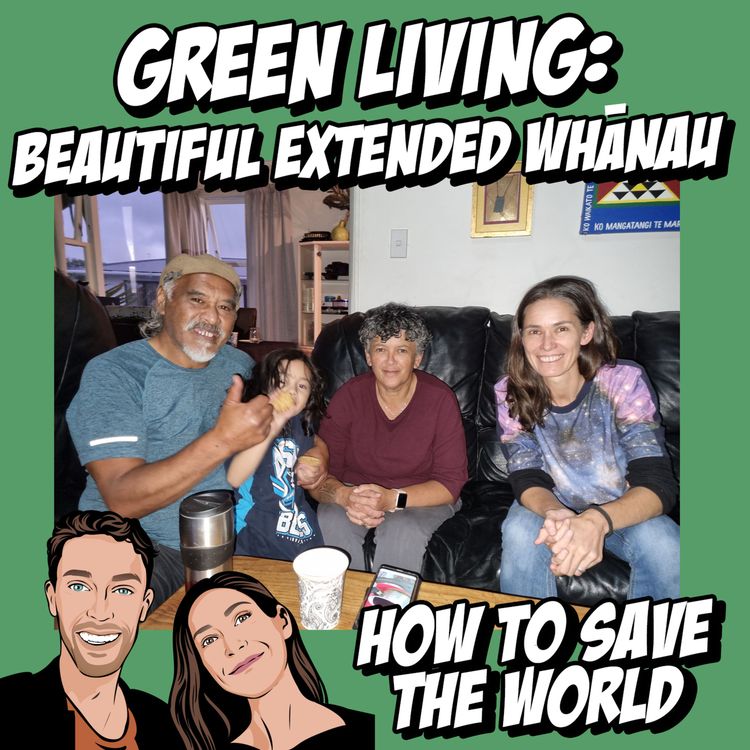
How To Save The World Podcast
Green Living: Beautiful Extended Whānau
Journey into the world of Koia and Robyn, living sustainably in Manurewa, Auckland, with 9 other whānau members in a ‘not much bigger than average’ sized house. The episode starts with Koia leading a pōwhiri to formally welcome Tim and Waveney into their home and bless their time together. After the pōwhiri, Robyn shares her homemade feijoa cake and extraordinary feijoa skin fermented fizzy drink (how to details in episode). The manaaki and aroha flow out of Koia and Robyn, encompassing not just their whānau, but their community, and their environment. They both work professionally supporting others to be their best, Robyn working with tamariki at a kōhanga reo (https://www.kohanga.ac.nz/) ; and Koia working with community members at the ME Family Services centre in Mangere East (http://www.mefsc.org.nz/). Koia shares from the heart about how Whare Tapa Whā transformed his life and about how they got to where they are today as a whānau.
Glossary of terms:
· Whānau / family
· Pōwhiri / welcome ceremony
· Manaaki / to show respect, generosity and care for others
· Aroha / love
· Tamariki / children
· Kōhanga reo / Māori language nest school
· Whare Tapa Whā / a Māori model of health and wellbeing encompassing:
o Taha tinana (physical health)
o Taha wairua (spiritual health)
o Taha whānau (family health)
o Taha hinengaro (mental health)
More episodes
View all episodes
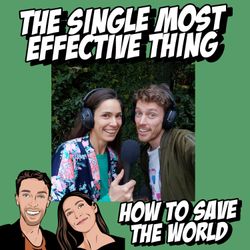
The Single Most Effective Thing
31:46|This podcast show started with Waveney asking the question, “what is the single most effective thing I can do to save the planet?’ Two years on, and 71 episodes later, both Tim and Waveney take stock of what actions seem to stand out from the rest and declare what their own personal ‘official’ winners. As always, the episode sticks to the show’s guiding kaupapa of focusing on simple solutions that trigger positive change through the whole collection of planetary woes from extinction, to microplastic, to climate change – connecting people with their power to make a difference. This episode is the last episode for Season 2 and the last for the series. We’d to thank our major funders, (Huckleberry, All Heart, Ethique, Ecotricity, Kokako and the Live Lightly team at Auckland Council); the How to Save the World Team (Brody, Mariel and others who volunteered their time); and our amazing guests, listeners and biggest thanks of all to our partners, Zoe and Matthew.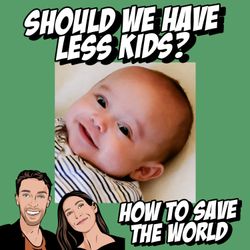
Should We Have Less Kids?
49:37|The desire to have and love children is one of the strongest, most basic human urges. But studies show that having less kids or no kids is by far the single most impactful action you can take to create a more sustainable tomorrow. So is there any wiggle room in these studies? Or could we justify having a baby on other grounds? Perhaps countries with low birth rates and high consumption rates, (i.e us here in Aotearoa and other wealthy nations), should actually focus the way we consume? We love babies here at How to Save the World and see this episode as a chance to personally reflect on what feels right for you, not as a chance to forward to your prodigiously reproducing friends. It’s a hard topic - so hard in fact that it is usually completely omitted from civic debate or sustainability forums. Thanks to those who have gone there, notably: North & South Magazine, Feb 2020, ‘Saving Planet Earth One (Less) Child at a Time’ by Sharon StephensonPopulation Matters (website & Facebook page)8 Billion Angels movieUN Sustainable Development Goals - less population video:University of Lund and University of British Columbia, 2017 Study (cited in N&S article)BIoScience journal, 2019 Report, ‘World scientists’ warning of a climate emergency, (cited in N&S article)Project Drawdown, health & education of women If you’d like to take more control of your fertility: Hooray, in Aotearoa all LARCS (long lasting reversible contraceptives) (i.e. implant and IUDs) are now completely funded. Have a contraception plan: visit any Family Planning Clinic for professional, non judgemental advice and support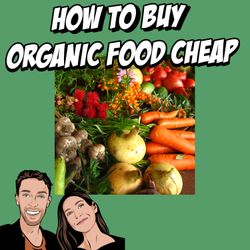
How To Buy Organic Food Cheap
50:00|Buying organic food (food grown without the use of synthetic fertilisers and pesticides) is crucial to restoring the earth and protecting our biodiversity. But it costs the earth to do the right thing, right? WRONG! In many cases, buying organic food can save you money. In this episode, Waveney explains how.It all starts with intention, knowing WHY to buy organic and making the decision. According to the UN’s 2014 report on Food and Agriculture, the planet only has 53 harvests left on our current trajectory.If you’re a regular supermarket shopper, it can be as simple as looking for the organic label of the food you’re already getting, which may involve looking in the slightly less obvious bits of the aisle. Getting a food box delivery service that does organic veges like Ooooby is also an easy and cost-effective method of going organic – the meal plans mean you usually wind up with no spoiled ingredients. Farmer’s markets are a great way to source organics from your local area and connect with farmers who can tell you right there and then whether they’re growing organic crops – if you’re buying in season fruit and vege, even their organic prices will often beat the supermarket. Now we even have chains who focus on sustainable products, like Huckleberry, who have a huge range of products under one roof.Buying organic food in bulk and joining a collective are great ways to save some serious coin. Try looking on Facebook groups for collectives in your area. Or get your own wholesale account from Ceres Organics and Ecostore. Just enquire via the website. Both have a minimum order value and minimum amounts of the product you can buy, so ask a couple of friends to join in.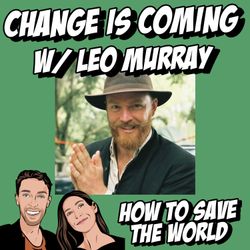
Change Is Coming w/ Leo Murray
53:49|One year on from our last discussion with self-described Worm Guy (and Why Waste founder) Leo Murray, he returns to discuss with Tim and Waveney what lessons we've learned from living with COVID for the past 12 months, and what we need to do next to try and protect our planet. We discuss the implications of simpler living during lockdown and the false dichotomy of mitigation vs. adaptation when it comes to responding to the climate crisis. We also chat about how we, as a species, may need change our thinking from relying on technology to connecting with each other.We also celebrate the incredible change that we're seeing in ourselves and those around us, including tremendous uplift in the amount of shared understanding that change is coming and we need to address the climate and protect our environment. We also talk about Aotearoa New Zealand's unique gift in the form of te ao Māori and what we can learn from our tangata whenua’s world perspective.Check out Leo’s worm farm rental business WhyWaste here: (Hire a wormfarm — Why Waste | Worm Farm Memberships)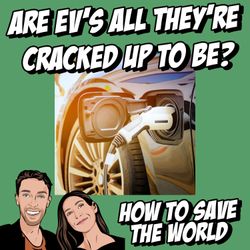
Are EV’s All They're cracked Up To Be?
53:04|Many countries including the UK, Sweden, France, Norway and the Netherlands are phasing out combustion engine vehicles in favour of EV vehicles. Here in Aotearoa, while there isn’t any comparable government declarations (yet), demand for electric vehicles, bikes, scooters etc is growing. This episode explores how EVs compare to fossil fuel cars in environmental terms as well as in terms of price, user experience and convenience. It’s a broad analysis covering the ‘old favourite’ pros and cons of EVs, new technological advancements and a peek into what our near ‘EV future’ could look like.Special thanks to Theo Gibson from NZ EV podcast, Robyn Parkinson, an EV salesperson; and Matthew - EV enthusiast, EV driver and investor – who all generously gave me their time.ResourcesLithium-ion battery recycling drop off in West Auckland: EcoMattersE World Expo: 6 - 8 May 2021, The Trusts Arena, AucklandEV NZ calculators and buyers guidesEcotricity Buyer's GuideLeading the ChargeFlip the FleetRobyn has kindly allowed us to share her EV buyers seminar ppt with you all, which is some of the clearest info I’ve seen overviewing the considerations (Google Slides)2017 video on cobalt minesSourcesGreen House GasesNZ’s GHG emission sourcesEVs EECA Life Cycle Assessment of Electric Vehicles in Aotearoa (warning: PDF)EVs v Fossil cars stuff reportLithiumHow does Lithium mining work, 2018McKinsey &; Company Lithium and Cobalt: A tale of two commodities, 2018CobaltAmnesty’s 2016 Cobalt Child Labour videoGuardian’s 2020 updateBattery techTesla’s Battery Day announcement, 2020, YouTube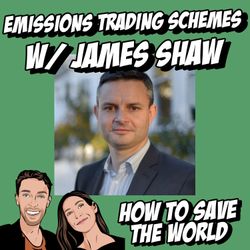
Emissions Trading Schemes w/ James Shaw
50:19|The Emissions Trading Scheme (ETS) is the New Zealand government's most powerful tool in reducing the amount of carbon we put into the atmosphere. But what exactly is an ETS? Tim sat down with Hon James Shaw, Minister for Climate Change (and co-leader of The Green Party of Aotearoa New Zealand) to get some questions answered.If you've ever wondered HOW scientists measure the carbon capturing abilities of different trees, wanted to know whether native New Zealand trees are treated differently in the ETS or if the Government recognises the immense carbon capturing abilities of soil - you're in luck! James Shaw also shares some challenges he's had in his personal journey in reducing his carbon footprint at home.LINKSMinistry for the Environment’s ETS explainerStuff's 'Climate explained: How emissions trading schemes work and can they help us shift to a zero carbon future'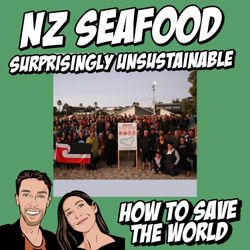
NZ Seafood: Surprisingly Unsustainable
01:00:57|Seafood New Zealand and our Ministry for Primary Industries tell us that we have a sustainable fishery, but many hapū, marine scientists and ANYONE trying to catch fish without commercial fishing equipment say it’s getting harder and harder to catch and eat fish, crays, and shellfish around the coast of Aotearoa. Join TIm and Waveney as they explore who’s right and how to make sure the fish you eat is not leading to the extinction of Maui’s dolphins or our unique seabirds or trawling through and destroying the seafloor ecosystem. Dig deeper with the associated how to Save the World blog: https://www.howtosavetheworld.nz/blog/is-it-ok-to-eat-fish-in-new-zealand.Links and resources:Rescue Fish petition: https://rescuefish.co.nz/ (from LegaSea)Zero By Catch pledge: https://www.forestandbird.org.nz/campaigns/zero-bycatchThe Price of Fish Documentary, https://www.youtube.com/watch?v=dIQNDYoymMU (from LegaSea). Best Fish Guide, http://bestfishguide.org.nz/ (from Forest & Bird)LegaSea (New Zealand Sport Fishing Council)www.legasea.co.nzManifesto for inshore fisheries: https://legasea.co.nz/about-us/what-is-legasea/manifesto/Forest & BirdOcean landing page: https://www.forestandbird.org.nz/what-we-do/oceansBriefing for incoming ministers (Forest & Bird’s most succinct summary of the issues and proposition for change) https://www.forestandbird.org.nz/sites/default/files/2021-02/Forest%20%26%20Bird%20Briefing%20to%20the%20Incoming%20Government%202021.pdfPhoto credit: Rachel Mataira / Our Auckland https://ourauckland.aucklandcouncil.govt.nz/articles/news/2021/02/waiheke-local-board-gives-support-for-rahui-to-protect-the-island-s-kaimoana/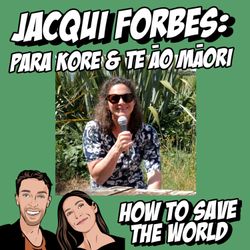
Jacqui Forbes - Para Kore & Te Āo Māori
36:35|Production Note: Some of this conversation was featured in our last episode. This episode contains the conversations with Jacqui, in its entirety.Waveney chats to Jacqui Forbes (Ngāruahine), the Kaihautū Matua (General Manager) for the Māori zero waste organisation Para Kore. Starting with Poihakena Marae in Raglan/Whaingāroa, Para Kore now has now touch almost half a million participants at wananga, events and presentations.Jacqui is sharing knowledge with and between marae throughout Aotearoa to reduce waste and pass on methods to work with the environment. Her philosophy is steeply grounded in a Te Ao Māori perspective and using mythology like the Māori creation story - borne of the separation of Papatūānuku and Ranginui, we can look at we humans as being the youngest creatures inhabiting the land. Respecting that we are part of nature and thus need to protect our fellow living beings felt very normal to Jacqui from a young age and she shares stories from her upbringing which still inform her approach today.LinksCollapse by Jared DiamondPara Kore's website